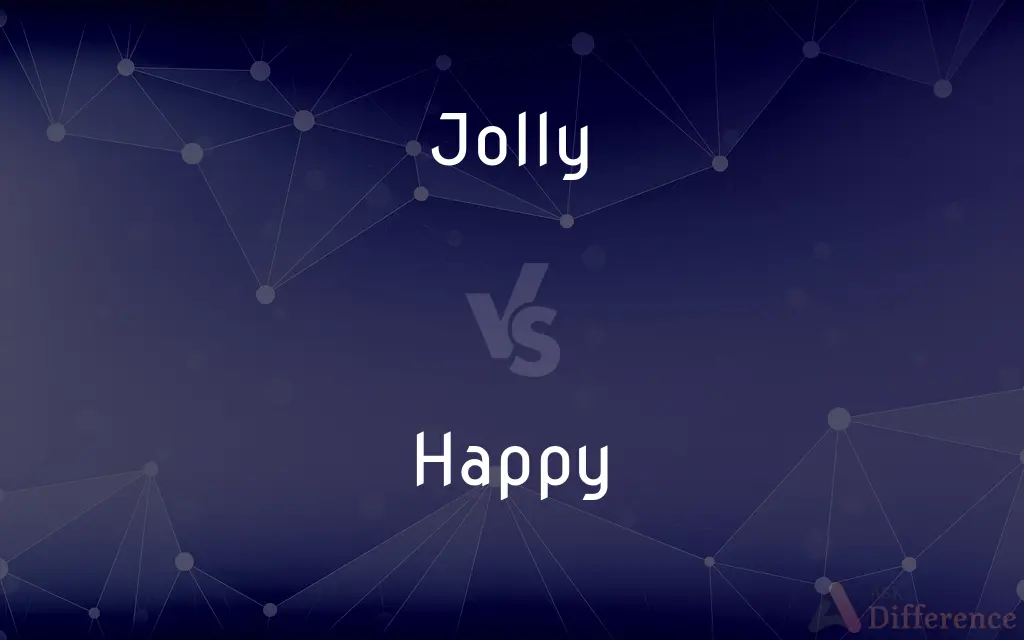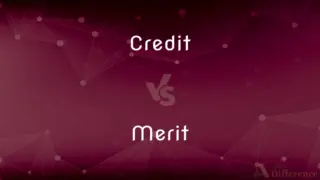Jolly vs. Happy — What's the Difference?
By Maham Liaqat & Urooj Arif — Updated on March 8, 2024
Jolly implies a lively and cheerful demeanor, often associated with robust mirth, while happy denotes a state of contentment or pleasure.

Difference Between Jolly and Happy
Table of Contents
ADVERTISEMENT
Key Differences
Jolly often conveys a sense of hearty, joyous laughter or good spirits, typically in a social context or festive setting. It suggests a more outward, expressive form of happiness, characterized by a bright, infectious cheerfulness. On the other hand, happiness is a broader emotional state that encompasses feelings of contentment, satisfaction, and well-being, not necessarily accompanied by outward expressions of joy.
While jolly might be used to describe someone's buoyant mood or personality, especially in a convivial atmosphere, happy can refer to a more internal, personal sense of fulfillment or joy. Happiness can be derived from a wide range of experiences, from profound life achievements to simple pleasures, and does not always manifest in overt expressions like jolliness.
The term jolly is often associated with festive occasions and gatherings, such as holidays or celebrations, where there's an emphasis on communal joy and merriment. In contrast, happiness can be experienced both in social settings and in solitude, stemming from a variety of sources including personal achievements, relationships, or even a state of peace and contentment with one's life.
Jolliness can sometimes be temporary and influenced by specific events or environments that encourage a lively spirit, such as a party or a humorous situation. Happiness, however, can be a more enduring state, influenced by overall life circumstances, personal fulfillment, and emotional well-being.
Comparison Chart
Nature
Expressive, outward cheerfulness.
An internal state of contentment or pleasure.
ADVERTISEMENT
Context
Often social or festive.
Can be experienced in any setting.
Duration
Can be temporary, influenced by the environment.
Often a more enduring emotional state.
Expression
Characterized by laughter and merriment.
Can be expressed outwardly or felt internally.
Associated With
Festivities, social gatherings.
Personal achievements, relationships, peace.
Compare with Definitions
Jolly
Marked by high spirits and lively mirth.
The jolly atmosphere at the reunion was contagious.
Happy
Feeling or showing contentment or pleasure.
She felt happy after receiving good news.
Jolly
Cheerful and full of good humor.
His jolly demeanor made him popular at social gatherings.
Happy
Fulfilled and at peace with one's circumstances.
He was happy living a simple, uncluttered life.
Jolly
Expressing joy through laughter and joviality.
The room was filled with jolly laughter.
Happy
Joyful and pleased with specific situations.
They were happy to see their friends after so long.
Jolly
Associated with festive occasions.
The holiday season is a time for jolly celebrations.
Happy
Characterized by a sense of well-being and satisfaction.
A happy childhood contributes to emotional health.
Jolly
Reflecting a hearty, convivial spirit.
The jolly old man entertained everyone with his stories.
Happy
Denoting a positive, cheerful state of mind.
Her happy disposition brightened the office.
Jolly
Full of good humor and high spirits.
Happy
Feeling or showing pleasure or contentment
They are happy to see me doing well
Melissa came in looking happy and excited
We're just happy that he's still alive
Jolly
Exhibiting or occasioning happiness or mirth; cheerful
A jolly tune.
Happy
Fortunate and convenient
He had the happy knack of making people like him
Jolly
Greatly pleasing; enjoyable
Had a jolly time.
Happy
Inclined to use a specified thing excessively or at random
They tended to be grenade-happy
Jolly
To a great extent or degree; extremely.
Happy
Enjoying, showing, or marked by pleasure, satisfaction, or joy
A happy child.
The happiest day of my life.
Jolly
To keep amused or diverted for one's own purposes; humor.
Happy
Cheerful; willing
Happy to help.
Jolly
To amuse oneself with humorous banter.
Happy
Characterized by good luck
A happy sequence of events.
Jolly
Chiefly British A good or festive time.
Happy
Being especially well-adapted; felicitous
A happy turn of phrase.
Jolly
Jollies(Slang) Amusement; kicks
However you get your jollies is fine with me.
Happy
Characterized by a spontaneous or obsessive inclination to use something. Often used in combination
Trigger-happy.
Jolly
Full of merriment and high spirits; jovial; joyous; merry.
Happy
Enthusiastic about or involved with to a disproportionate degree. Often used in combination
Money-happy.
Clothes-happy.
Jolly
Splendid, excellent, pleasant.
Happy
Having a feeling arising from a consciousness of well-being or of enjoyment; enjoying good of any kind, such as comfort, peace, or tranquillity; blissful, contented, joyous.
Music makes me feel happy.
Jolly
(informal) drunk
Happy
Experiencing the effect of favourable fortune; favored by fortune or luck; fortunate, lucky, propitious.
Jolly
A pleasure trip or excursion.
Happy
Content, willing, satisfied (with or to do something); having no objection (to something).
Are you happy to pay me back by the end of the week?
Yes, I am happy with the decision.
Jolly
A marine in the English navy.
Happy
(Of acts, speech, etc.) Appropriate, apt, felicitous.
A happy coincidence
Jolly
Very, extremely
It’s jolly hot in here, isn’t it?
Happy
(in combination) Favoring or inclined to use.
Slaphappy, trigger-happy
Jolly
(transitive) To amuse or divert.
Happy
Dexterous, ready, skilful.
Jolly
Full of life and mirth; jovial; joyous; merry; mirthful.
Like a jolly troop of huntsmen.
"A jolly place," said he, "in times of old!But something ails it now: the spot is cursed."
Happy
Implying 'May you have a happy ~' or similar; used in phrases to wish someone happiness or good fortune at the time of a festival, celebration, or other event or activity.
Happy birthday!, Happy Fourth of July!, Happy anniversary!, Happy job-hunting!
Jolly
Expressing mirth, or inspiring it; exciting mirth and gayety.
And with his jolly pipe delights the groves.
Their jolly notes they chanted loud and clear.
Happy
A happy event, thing, person, etc.
Jolly
Of fine appearance; handsome; excellent; lively; agreeable; pleasant.
Full jolly knight he seemed, and fair did sit.
The coachman is swelled into jolly dimensions.
Happy
Often followed by up: to become happy; to brighten up, to cheer up.
Jolly
To cause to be jolly; to make good-natured; to encourage to feel pleasant or cheerful; - often implying an insincere or bantering spirit; hence, to poke fun at.
We want you to jolly them up a bit.
At noon we lunched at the tail of the ambulance, and gently "jollied" the doctor's topography.
Happy
Often followed by up: to make happy; to brighten, to cheer, to enliven.
Jolly
A marine in the English navy.
I'm a Jolly - 'Er Majesty's Jolly - soldier an' sailor too!
Happy
Favored by hap, luck, or fortune; lucky; fortunate; successful; prosperous; satisfying desire; as, a happy expedient; a happy effort; a happy venture; a happy omen.
Chymists have been more happy in finding experiments than the causes of them.
Jolly
A happy party
Happy
Experiencing the effect of favorable fortune; having the feeling arising from the consciousness of well-being or of enjoyment; enjoying good of any kind, as peace, tranquillity, comfort; contented; joyous; as, happy hours, happy thoughts.
Happy is that people, whose God is the Lord.
The learned is happy Nature to explore,The fool is happy that he knows no more.
Jolly
A yawl used by a ship's sailors for general work
Happy
Dexterous; ready; apt; felicitous.
One gentleman is happy at a reply, another excels in a in a rejoinder.
Jolly
Be silly or tease one another;
After we relaxed, we just kidded around
Happy
Enjoying or showing or marked by joy or pleasure or good fortune;
A happy smile
Spent many happy days on the beach
A happy marriage
Jolly
Full of or showing high-spirited merriment;
When hearts were young and gay
A poet could not but be gay, in such a jocund company
The jolly crowd at the reunion
Jolly old Saint Nick
A jovial old gentleman
Have a merry Christmas
Peals of merry laughter
A mirthful laugh
Happy
Experiencing pleasure or joy;
Happy you are here
Pleased with the good news
Jolly
Used as an intensifier (`jolly' is used informally in Britain);
Pretty big
Pretty bad
Jolly decent of him
Happy
Marked by good fortune;
A felicitous life
A happy outcome
Happy
Satisfied; enjoying well-being and contentment;
Felt content with her lot
Quite happy to let things go on as they are
Happy
Exaggerated feeling of well-being or elation
Happy
Well expressed and to the point;
A happy turn of phrase
A few well-chosen words
A felicitous comment
Common Curiosities
What does it mean to be jolly?
Being jolly means exhibiting a lively, cheerful demeanor, often with hearty laughter and high spirits.
Can a person be happy without being jolly?
Yes, a person can be happy without being jolly, as happiness is an internal state that doesn't always require outward expressions of joy.
What are common situations where someone might feel jolly?
Common situations include social gatherings, celebrations, and festive occasions where communal joy is encouraged.
How is being happy different from being jolly?
Being happy refers to a state of contentment and pleasure, which can be internal and serene, while being jolly is more about outward expressions of cheerfulness and mirth.
Does happiness depend on external factors?
While happiness can be influenced by external factors like relationships and achievements, it also depends on internal states of mind and perspectives.
How does one's environment affect their jolliness or happiness?
The environment, including social settings and physical surroundings, can significantly impact one's ability to feel and express jolliness and happiness.
Is jolliness a temporary state?
Jolliness can be temporary, often influenced by social interactions, festive settings, or specific joyful events.
Can jolly people influence others' moods?
Yes, jolly people can positively influence others' moods through their infectious laughter and cheerful demeanor.
Are there cultural differences in expressing jolliness and happiness?
Yes, cultural norms can influence how openly jolliness and happiness are expressed and perceived.
Is it important to strive for both jolliness and happiness?
Striving for both can contribute to a well-rounded emotional life, enhancing personal well-being and social connections.
Share Your Discovery

Previous Comparison
Interframe vs. Intraframe
Next Comparison
Credit vs. MeritAuthor Spotlight
Written by
Maham LiaqatCo-written by
Urooj ArifUrooj is a skilled content writer at Ask Difference, known for her exceptional ability to simplify complex topics into engaging and informative content. With a passion for research and a flair for clear, concise writing, she consistently delivers articles that resonate with our diverse audience.
















































